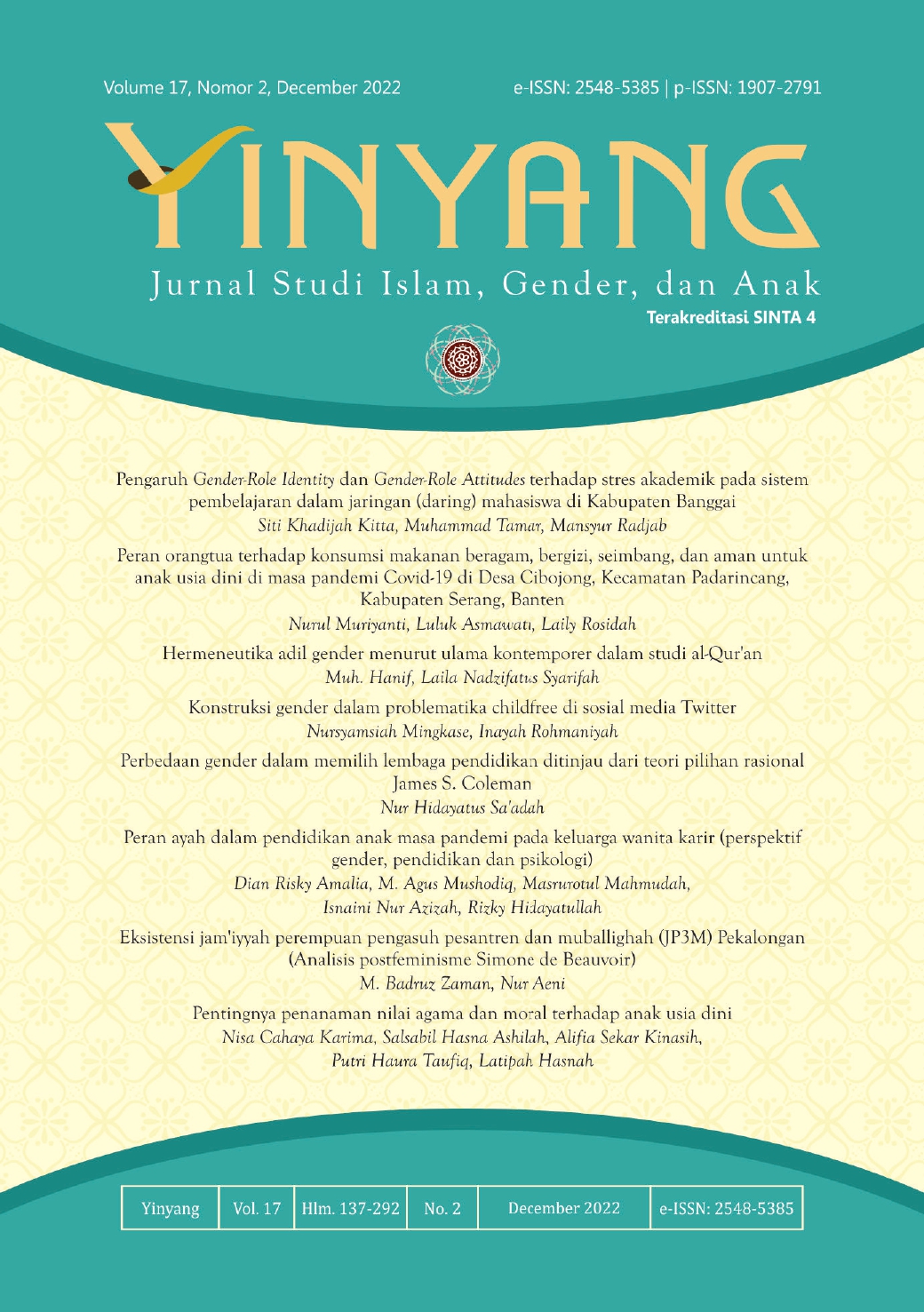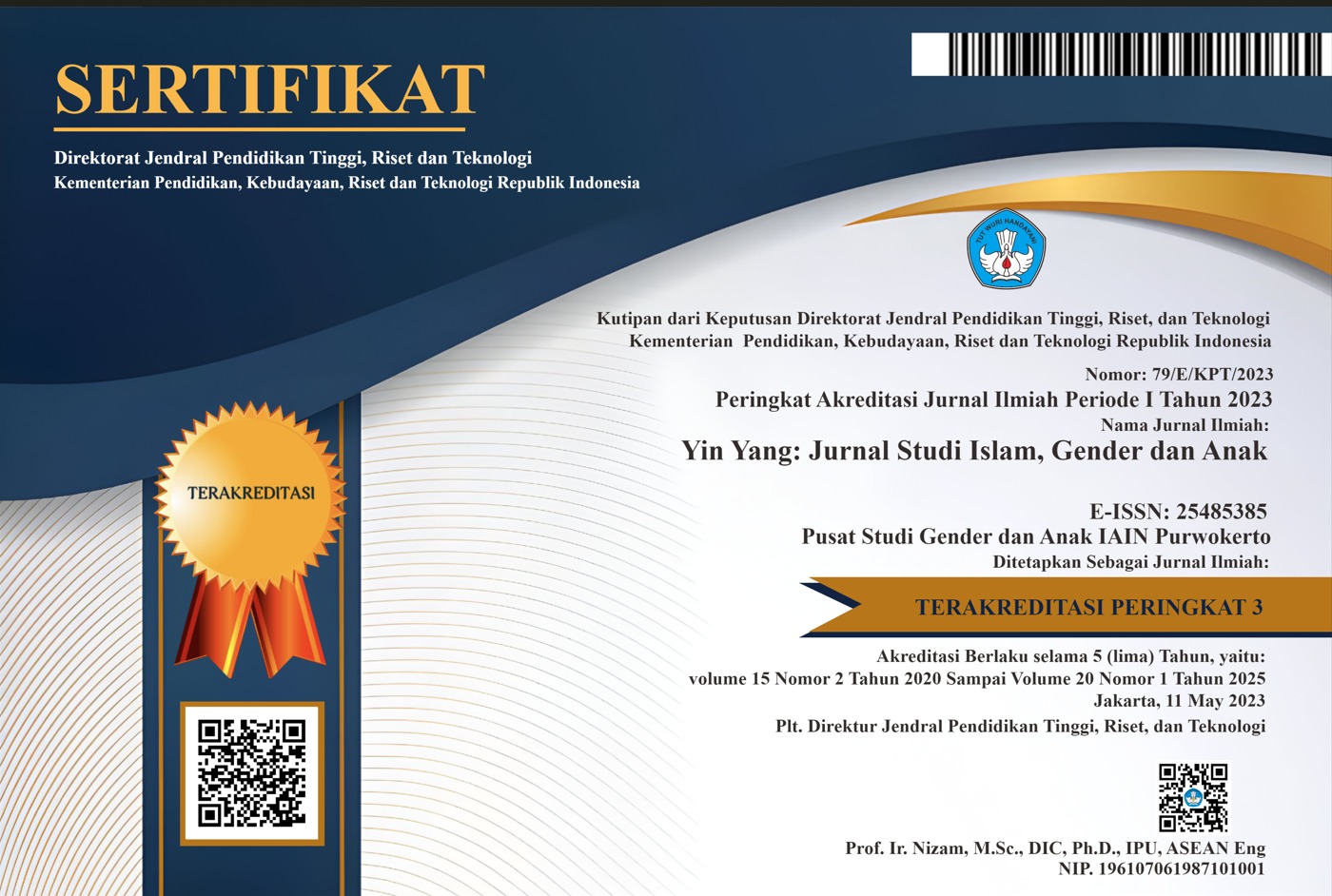Hermeneutika adil gender menurut ulama kontemporer dalam studi al-Qur’an
DOI:
https://doi.org/10.24090/yinyang.v17i2.6870Keywords:
Hermeneutika, Gender, penelitian keagamaanAbstract
This article discusses the hermeneutical approach to gender in terms of comparisons from contemporary scholars. Islam is a religion that teaches justice or gender equality. However, the dominance of patriarchal ideology in the interpretation of the Qur'an results in a misogynistic interpretation that is not gender-just. Gender construction places the dominant male in the private sector, namely the family sphere, and the public sector, namely the community and work environment. Allah SWT judges His servants in terms of piety and faith, not from gender, ethnicity, nation, even descent. Contemporary scholars are trying so that the Qur'an can be understood its implied messages correctly and comprehensively, without taking sides with one group, class, more specifically on gender differences. The interpretation of Allah's messages from the Qur'an is sought to develop to be more gender-just. If the Qur'an is understood and interpreted textually only, it will result in a misogynistic interpretation of gender inequality that cannot solve the problems that develop. The implication is that the Qur'an is impressed as an outmoded product, a foreign product, perhaps even abandoned by its loyal followers. This view of gender as seen from hermeneutics has different perspectives but both uphold gender equality. The data sources used in this article are taken from various philosophical literature studies. The result is an equal position between women and men.Downloads
References
Alfian, M. (2018). Hermeneutika Nasr Hamid Abu Zayd. Islamika : Jurnal Ilmu-Ilmu Keislaman, 18(01). https://doi.org/10.32939/islamika.v18i1.268
Bahri, S., & Fiqria, N. (2022). Pengarusutamaan Gender dalam Penafsiran Al-Qur’an Menurut Amina Wadud Muhsin. Jurnal Ilmiah Al-Muashirah, 19(2). https://doi.org/10.22373/jim.v19i2.13522
Barash, J. A. (2022). Martin Heidegger and The Problem of Historical Meaning. New York 10020: Fordham University Press.
Barlas, A. (2019). Believing women in Islam: Unreading patriarchal interpretations of the Quran. Texas: University of Texas Press.
Bashir, K. (2021). The Quran in South Asia: Hermeneutics, Quran Projects, And Imaginings of Islamic Tradition in British India. London: Routledge.
Derrida, J. (2020). Deconstruction in A Nutshell: A Conversation with Jacques Derrida, with A New Introduction. New York: Fordham University Press.
Dilthey, W., & Rickman, H. P. (2020). Pattern & Meaning In History: Thoughts on History & Society. London: Routledge.
Duderija, A. (2020). Contemporary Muslim Male Reformist Thought and Gender Equality Affirmative Interpretations of Islam. Feminist Theology, 28(2). https://doi.org/10.1177/0966735019886076
Faiz, M. F. (2015). Teori Hermeneutika Al-Qur’an Nashr Hamid Abu Zayd dan Aplikasinya Terhadap Wacana Gender dalam Studi Hukum Islam Kontemporer. Jurnal al-Ahwal, 7(1).
Fathony, A., Nor, R., & Hamid, A. (2020). Rekonstruksi Penafsiran Tentang Ayat-Ayat Aurat Perempuan Di Nusantara Perspektif Muhammad Syahrur. Jurnal Islam Nusantara, 04(02). https://doi.org/10.33852/jurnalin.v4i2.222
Gilhus, I. S. (2021). Hermeneutics: The Routledge handbook of research methods in the study of religion. Routledge.
Hasan, F., & Robikah, S. (2020). Model Pembacaan Kontekstual Nasr Hamid Abu Zayd Terhadap Teks Suci Keagamaan (Al-Qur’an). Jurnal Ilmiah Citra Ilmu, 16(31).
Izzah, I. (2021). Pendekatan Hermeneutika untuk Gerakan Gender. Al-Fikru: Jurnal Pendidikan dan Sains, 2(1).
Jaya, S. A. F. (2020). Al-Qur’an Dan Hadis Sebagai Sumber Hukum Islam. Jurnal Indo-Islamika, 9(2). https://doi.org/10.15408/idi.v9i2.17542
Khaidir, E. (2014). Pendidikan Islam untuk Wanita. Pekanbaru: LPPM.
Krisdiana, P. (2021). Argumentasi Dan Posisi Fatima Mernissi Dalam Menjelaskan Hadis Misogini. Maqosid: Jurnal Studi Keislaman dan Hukum Ekonomi Syariah, 9(02).
Marhumah, E. (2011). Konstruksi sosial gender di pesantren; Studi kuasa kiai atas wacana perempuan. Yogyakarta: Lkis Pelangi Aksara.
Mohammed, Y. I. (2019). Gender biased interpretation of the Quran: contextualizing 4: 5 and the meaning of the term" sufahā". Texas University.
Muqoyyidin, A. W. (2013). Wacana Kesetaraan Gender : Pemikiran Islam Kontemporer Tentang Gerakan Feminisme Islam. Al-Ulum, 13(2).
Mustaqim, A., & Syamsuddin, S. (2002). Studi Al-Qurᾱn Kontemporer. Yogyakarta: PT. Tiara Wacana.
Muzayyin. (2015). Resepsi Hermeneutika dalam Penafsiran Alquran oleh M. Quraish Shihab. Nun, 1(1).
Narwoko, D., & Suyanto, B. (2004). Sosiologi Teks Pengantar dan Terapan. Jakarta: Kencana Media Group.
Nihayah, R. (2021). Kesetaraan Gender Melalui Pendekatan Hermeneutika Gadamer dalam Kajian QS Al-Hujurat Ayat 13. Syariati: Jurnal Studi Al-Qur’an dan Hukum, 7(1).
Palmer, R. E. (2005). Hermeneutika Teori Baru Mengenai Interpretasi. Yogyakarta: Pustaka Pelajar.
Putrawan, B. K., & Noya, L. B. J. (2020). Piety in Thoughts of John Wesley And Friedrich Schleiermacher. Jurnal Jaffray, 18(1). https://doi.org/10.25278/jj.v18i1.426
Rahman, F. (2017). Tema-tema Pokok Al-Qur’an. Bandung: Mizan Pustaka.
Reeder, J. C. (2020). Beyond Story: Ricoeurian Hermeneutics and Interactive Documentary. Monash University.
Rosyadi, S. (2019). Dialektika Dasein Dan Semesta Bahasa. Dialektika, 10(1).
Saenong, I. B. (2002). Hermeneutika Pembebasan. Jakarta.
Shihab, M. Q. (2020). Al-Qur’an dan Maknanya. Tangerang: Lentera Hati.
Sokolowski, R. (2018). Edmund Husserl and The Phenomenological Tradition. Washington, DC: CUA Press.
Sulaeman, M. (2020). Pemikiran Hermeneutika Al-Qur’an Hasan Hanafi dalam Studi Al-Qur’an di Indonesia. Salimiya: Jurnal Studi Ilmu Keagamaan Islam, 1.
Syaripudin, A. (2016). Al-Qur’an sebagai Sumber Agama Islam. Nukhbatul Ulum, 2(1). https://doi.org/10.36701/nukhbah.v2i1.9
Umar, N. (2006). Menimbang Hermeneutika Sebagai Manhaj Tafsir. Jurnal Studi Al-Qur’an, 1(1).
Verhaak, C., & Imam, R. H. (1989). Filsafat Ilmu Pengetahuan. Jakarta: Gramedia.
Zuhri, A. (2021). Hermeneutika Al-Qur`an Amina Wadud Muhsin. REVELATIA: Jurnal Ilmu al-Qur`an dan Tafsir, 2(2). https://doi.org/10.19105/revelatia.v2i2.5305
Downloads
Published
How to Cite
Issue
Section
License
Copyright (c) 2022 Muhammad Hanif, Laila Nadzifatus Syarifah

This work is licensed under a Creative Commons Attribution-ShareAlike 4.0 International License.
Authors who publish with this journal agree to the following terms: Authors retain copyright and grant the journal right of first publication with the work simultaneously licensed under a Creative Commons Attribution-ShareAlike 4.0 International License that allows others to share the work with an acknowledgment of the work's authorship and initial publication in this journal.

















